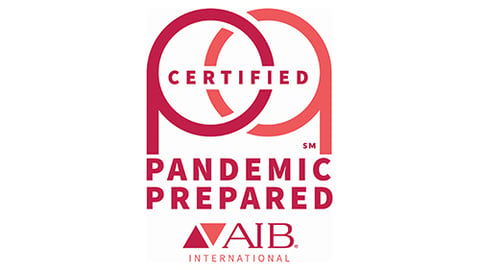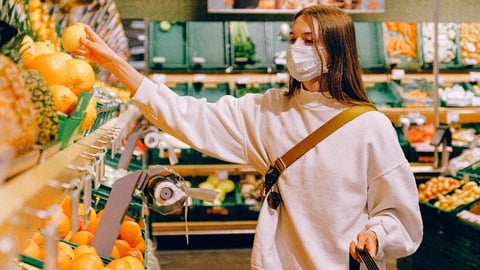Pandemic Prepared Certification: Setting the Packaging Standard
Last December, Industrial Packaging, a Webster, Massachusetts-based customized contract packaging manufacturer, technical services provider, and packaging materials and machinery supplier for manufacturers and distributors of foods, consumer and industrial goods, became the first packaging company in the world and the first U.S.-based company to achieve Pandemic Prepared Certification (PPC).
To find out more about what this certification entailed, Progressive Grocer spoke with Steve Robert, global VP, sales/marketing and product innovation at Manhattan, Kansas-based AIB International, the food and beverage consultant that offers the PPC program.
Progressive Grocer: Why do you offer Pandemic Prepared Certification?
Steve Robert: We developed the Pandemic Prepared Certification because the food and beverage supply chain were ill-prepared for a global pandemic and the associated disruption it created in nearly every aspect of business operations worldwide. The AIB International Pandemic Prepared Certification is a proactive measure to help companies across the supply chain prepare for the future with the only best-in-class protocol benchmark.
Certified operations are recognized as bringing the highest standards of integrity to the global food and beverage supply chain. This results in not only internal and social benefits, but also business continuity, and significant bottom-line impacts due to their demonstrated commitment to decreased risk.
PG: What does a packaging company need to do to receive this kind of certification?
SR: To achieve Pandemic Prepared Certification, companies need to demonstrate proficiency in five distinct areas: Pandemic Crisis Management, Supply Chain Management, Intermittent Operations Planning Management, Health Crisis Mitigation Measures and Management, and a Prerequisite Program Review.
The Pandemic Prepared Certification provides assurance for the food and beverage supply chain and consumers that your company is committed to establishing and maintaining best practices. Once certified to this standard, customers will know that you have best practices in place and can be confident in your ability to deliver, even under the most difficult circumstances. It also provides the supplier with a distinct marketing advantage when they can publicly communicate that their pandemic planning and protocols are certified as best-in-class by a third party.
PG: What effect is such certification for packaging likely to have on retailers and consumers?
SR: Throughout 2020, the pandemic has impacted the supply chains of so many operations, leaving some store shelves bare and consumers in need. Certification to the Pandemic Prepared standard provides assurance for the food and beverage supply chain, consumers and employees that your company is committed to establishing and maintaining best practices for supporting safety, employee health and business continuity.
In addition to proving elevated corporate social responsibility and providing assurance that products are made in a clean and sanitary environment, certification can enhance your business’ ability to mitigate the risk of being negatively impacted by the pandemic.
According to a report on director and officer (D&O) insurance costs from global credit-rating agency AM Best, they are expecting “triple-digit rate increases in a post-COVID-19 world.” This underscores the need for those companies in the food and beverage supply chain to put proactive measures like certification in place, which can build bottom-line resiliency and can unlock insurance benefits because of their demonstrated commitment to decreased risk.
As a result, certified suppliers, processors and manufacturers can keep their supply chains moving, and retailers can be confident that their shelves will be stocked and ready for consumers to purchase their favorite products.
PG: Do you think this type of certification is likely to outlive the current pandemic? Why or why not?
SR: Unfortunately, a Gallup Poll conducted Nov. 16-29 indicates that public distrust of vaccines remains high. They note that “the end of the pandemic is now tied at least in part to the speed with which sufficient numbers of Americans can get vaccinated.”
Further, in a Dec. 9 story from The New York Times, Marc Lipsitch, professor of epidemiology and director of the Center for Communicable Disease Dynamics at Harvard’s T.H. Chan School of Public Health, notes that the vaccine might never fully rid the world of COVID-19. “I can’t conceive of its disappearing,” he said. “Viral infections this widespread don’t disappear on their own that I’m aware of, unless they’re out-competed by some new strain.” As a result, we cannot forecast whether or when the pandemic will be “over.”
While few could have foreseen the impacts of this pandemic, it is not an isolated incident. The World Economic Forum notes that “COVID-19 is the sixth global health crisis since the flu pandemic of 1918.” They also estimate that there are up to 827,000 “undiscovered” viruses in mammals and birds that could infect humans. As a result, we believe there is now an urgency for operations leadership to do everything they can to mitigate the impacts of current and future pandemic events by elevating their critical planning and establishing industry-recognized best practices for supporting food safety, employee health and business continuity.











